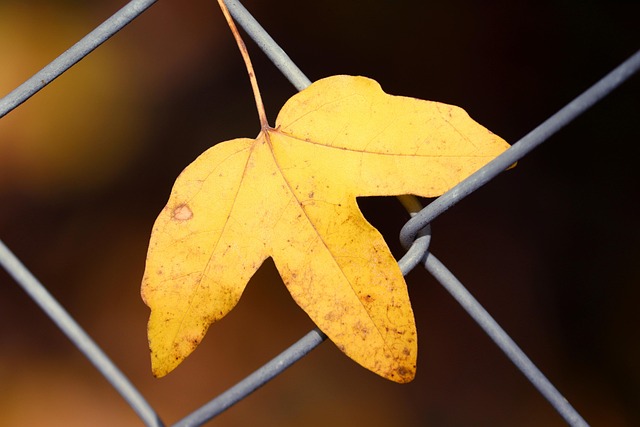In the pursuit of sustainable living, New Bedford, MA, residents now have a greener option when it comes to fencing—eco-friendly materials that offer both aesthetic appeal and environmental benefits. This article explores the diverse eco-friendly fencing options available in New Bedford, highlighting their advantages over traditional materials. From reduced environmental impact to long-term cost savings, these sustainable choices provide an appealing alternative for homeowners seeking to enhance their outdoor spaces responsibly.
- Eco-Friendly Fencing Options in New Bedford
- Benefits of Sustainable Fencing Materials
- Traditional vs. Eco-Conscious Fence Choices
- Local Availability and Installation Tips
- Long-Term Savings and Environmental Impact
Eco-Friendly Fencing Options in New Bedford
New Bedford, MA, residents now have a growing array of eco-friendly fencing options to choose from, catering to both aesthetic and environmental concerns. Traditional materials like wood, while popular, often face issues with treatment chemicals and sustainability. Fortunately, local suppliers offer alternatives such as recycled plastic, composite, and bamboo fences. These innovative choices not only reduce environmental impact but also provide long-lasting durability and low maintenance.
Recycled plastic fencing, made from post-consumer waste, is a top contender for its versatility and resilience. Composite fences, a blend of wood fibers and plastic, offer a similar look to traditional wooden fences but without the need for chemical treatments. Bamboo fences, known for their fast growth rate and strength, provide a unique, natural aesthetic while minimizing carbon footprint. These options cater to diverse landscape designs, ensuring New Bedford residents can contribute positively to the local ecosystem while enhancing their outdoor spaces.
Benefits of Sustainable Fencing Materials
In the pursuit of more sustainable living, opting for eco-friendly fencing materials offers a myriad of benefits in New Bedford, MA. These materials not only contribute to a healthier environment but also enhance the overall aesthetics of your property. Many traditional fencing options involve harmful production processes and can be difficult to recycle, whereas sustainable alternatives are designed with minimal ecological impact in mind. By choosing such materials, homeowners can reduce their carbon footprint and promote local ecosystems’ preservation.
Furthermore, eco-friendly fences often possess superior durability and resistance to rot, rust, and pest damage compared to conventional options. They require less maintenance, saving time and money in the long run. Many of these materials are also designed with flexibility and adaptability in mind, allowing for creative design possibilities while still maintaining a harmonious blend with natural landscapes.
Traditional vs. Eco-Conscious Fence Choices
In New Bedford, MA, as awareness of environmental impact grows, so does the demand for eco-conscious fencing options. Traditional fence materials like wood and vinyl often come with drawbacks—deforestation concerns for wood and significant carbon emissions for vinyl production. These conventional choices not only harm the environment but also contribute to local air pollution during manufacturing and installation.
By contrast, eco-friendly fencing materials offer a sustainable alternative. Options such as recycled plastic, bamboo, and metal from recycled sources are durable, low-maintenance, and free from harmful chemicals. They help reduce carbon footprints, preserve natural resources, and minimize waste, making them an ideal choice for residents looking to balance style, functionality, and environmental responsibility in their New Bedford homes or businesses.
Local Availability and Installation Tips
In New Bedford, MA, eco-friendly fencing materials are increasingly accessible, offering a sustainable alternative to traditional options. Local hardware stores and garden centers stock a variety of these materials, from recycled plastic and wood composites to natural fibers like hemp and bamboo. This local availability makes it convenient for homeowners and businesses to source these products without long-distance transportation, further reducing their environmental impact.
When installing eco-friendly fences, consider engaging local professionals who specialize in sustainable landscaping. These experts can provide valuable insights into the best materials for your specific needs and climate. They also ensure proper installation techniques, such as using earth-friendly adhesives and preservatives, which contribute to the long-term durability and performance of the fence while minimizing chemical usage.
Long-Term Savings and Environmental Impact
Eco-friendly fencing materials offer more than just an aesthetic appeal; they also provide long-term financial and environmental savings. These sustainable options, such as recycled plastic, wood from certified responsible sources, or natural fibers like hemp, are designed to withstand the test of time, reducing the need for frequent replacements. Unlike traditional fences that may require regular treatments with chemicals to prevent rot or pest damage, eco-friendly alternatives are generally low-maintenance and free from harmful substances, which can save homeowners significant costs over the years.
Moreover, choosing these materials contributes to a reduced environmental footprint. Many traditional fencing options are made from non-renewable resources and produce high carbon emissions during manufacturing and transportation. Eco-friendly fencing, however, leverages recycled materials or sustainable production methods, helping to minimize pollution, conserve natural resources, and promote biodiversity in New Bedford’s local ecosystem.
